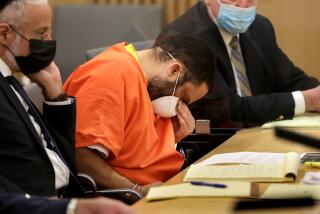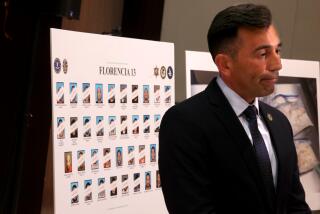Heavy Sentences Given in Drug Case Tied to Slaying : Crime: The defendants were acquitted of murdering a Fullerton police detective, but a judge gives them 18 years--near the maximum--for two felony cocaine counts.
- Share via
NORWALK — Two men convicted on drug charges but acquitted of murdering Fullerton detective Tommy De La Rosa were sentenced to 18 years in prison Friday after the judge heard emotional pleas for justice from De La Rosa’s relatives and his fellow police officers.
Rejecting defense requests for probation and easing law enforcement fears that his sentence might be light, Norwalk Superior Court Judge Charles E. Frisco imposed prison terms on Jesus Rodriguez Pena and Miguel Leon Escobar that were no more than two years short of the maximum penalty.
“The consequences of their actions were so severe and devastating that no probation is in order,” Frisco told the courtroom audience, which included De La Rosa’s widow and Fullerton Police Chief Phil Goehring. “The seven pernicious sins--greed and all the rest--manifested themselves throughout this case.”
Pena, 24, and Escobar, 36, were convicted in November on two felony drug counts stemming from a plot to buy 400 pounds of cocaine for $4 million from De La Rosa, who was conducting an undercover investigation.
The sting, one of the largest in the state, ended in a gun battle on June 21, 1990, in the driveway of a Downey home. Before he died of five gunshot wounds, De La Rosa, 43, managed to kill one gunman.
A Norwalk jury acquitted Pena and Escobar of first-degree murder but found them guilty of conspiracy to buy cocaine and the attempted purchase of the drug with intent to sell it. They were also convicted of trying buy more than 100 pounds of cocaine, a special sentencing enhancement that added 15 years to their prison terms.
“We are pleased that they got 18 years in this case,” said De La Rosa’s widow, Leslie, as she tried to hold back her tears outside Frisco’s courtroom. “That is about all we can say.”
Earlier in the case, the judge took the unusual step of ordering psychological evaluations of the defendants to help him determine their sentences. The move concerned Fullerton police, the De La Rosa family and Deputy Dist. Atty. Ellen Berk, the prosecutor, who said they thought that Frisco was strongly considering probation for Pena and Escobar.
Chief Goehring even wrote a letter to the judge in January requesting the maximum penalty and stating that the case “should not be taken lightly,” because an officer was killed.
“I think the sentence was appropriate and supports the law,” Goehring said Friday at the Norwalk courthouse. “I didn’t think he would do this when he ordered that work-up. It gave us a false signal, but he did follow the law.”
Before pronouncing sentence, Frisco heard two emotionally charged statements from Fullerton Detective Dan Hughes, who was De La Rosa’s partner, and Doyle Anthony, the slain officer’s father-in-law.
“Pena and Escobar must be held responsible for their action,” Anthony told the court. “Anything less would be an unforgivable sin. Their actions not only led to the death of Officer Tommy De La Rosa. They also destroyed the lives of the family and robbed a little girl of her father. There are no words to describe the pain and devastation I felt and what the family felt on the day that Tommy was murdered.”
Anthony, who was trembling during his presentation and stopped talking occasionally to regain his composure, asked Frisco for the maximum sentence. He said it was “a well-known fact” that drug dealers serve less than a year in jail before preying once again on children and the public.
“If this case does not fit the standard for imposing the maximum sentence possible, then our partner, Detective Tommy De La Rosa, clearly died in vain,” Hughes told the court, “and those of us who continue to risk our lives for a drug-free society will have been betrayed and forgotten by the judicial system.”
Hughes, 28, a six-year veteran of the department, was stationed up the street from the Downey home when De La Rosa was shot. Outside the courtroom, he told about his frustration with the case and his assignment on the drug detail.
“Without a doubt, these defendants were involved in the murder,” said Hughes, who helped investigate the slaying. “It was impossible for them to think it was just a cocaine deal. They tell us to fight a war, but they won’t let us win it.”
Concerned that their clients might be punished for a murder they were acquitted of, defense attorneys contended that Pena and Escobar deserved probation because they have no prior records and were only chauffeurs or facilitators who arranged introductions between De La Rosa and the main cocaine dealers.
John H. Wilbur, Escobar’s attorney, argued that his client never participated in meetings where the drug deal or an ambush was discussed, nor was Escobar privy to details of the arrangement struck with De La Rosa, such as the amount of cocaine or the price.
“I feel sorry for everyone in this case. Killing an officer is terrible,” Wilbur said. “But I keep hearing my client is guilty of murder, when he was acquitted of murder.”
Citing probation reports and the diagnostic study, the prosecutor pointed out to the court that Pena and Escobar continue to deny their involvement in the drug deal and hold no remorse for the slain officer.
Berk said after the hearing that the diagnostic report ordered by Frisco indicated that both men were involved in a sophisticated conspiracy and had to know that there was a plan to kill De La Rosa.
“You know, the second anniversary of the slaying is going to fall on Father’s Day,” Berk said. “His little girl is never going to have a Father’s Day.”
Friday’s sentences were the first handed down in the 2-year-old homicide case. Two other defendants--Escobar’s wife, Ydalvys Gonzales Escobar, and Luis Plantillas Benitez--are scheduled to be sentenced next week on drug charges.
Still to be tried are three alleged gunmen--Raul Meza, Omar Yuriar Noriega and Jerome Leon Sanchez--who face the death penalty if convicted. Also facing drug charges is Frederico E. Marriott. All are Mexican nationals who gave addresses in Bell, Placentia and Downey. They are being held without bail.
More to Read
Sign up for Essential California
The most important California stories and recommendations in your inbox every morning.
You may occasionally receive promotional content from the Los Angeles Times.











